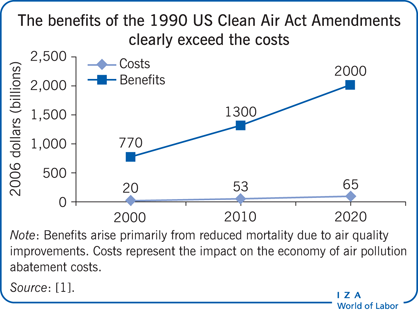Elevator pitch
Environmental regulations raise production costs at regulated firms, though in most cases the costs are only a small fraction of a firm’s total costs. Productivity tends to fall, and firms may shift new investment and production to locations with less stringent regulation. However, environmental regulations have had enormous benefits in terms of lives saved and illnesses averted, especially through reductions in airborne particulates. The potential health gains may be even greater in developing countries, where pollution levels are high. The benefits to society from environmental regulation hence appear to be much larger than the costs of compliance.

Key findings
Pros
Environmental regulations have greatly improved air and water quality, especially in areas that were dirtiest before regulation.
Reducing airborne particulates is especially beneficial, saving thousands of lives and preventing millions of illnesses each year.
The potential health benefits may be even greater in developing countries, where pollution levels are high.
Efforts to reduce greenhouse gas emissions have potentially large human health and economic benefits from slowing climate change and may drive development of cleaner technologies.
Cons
Environmental regulations raise production costs and lower productivity by requiring firms to install pollution control equipment and change production processes.
Regulatory costs can influence firms’ decisions about locating new plants and shifting production among existing plants.
Stricter regulations on new plants can discourage new investment and keep dirtier plants operating longer than originally expected.
Benefits from new regulations do not always exceed costs, especially after considering just the incremental benefits relative to existing regulations.